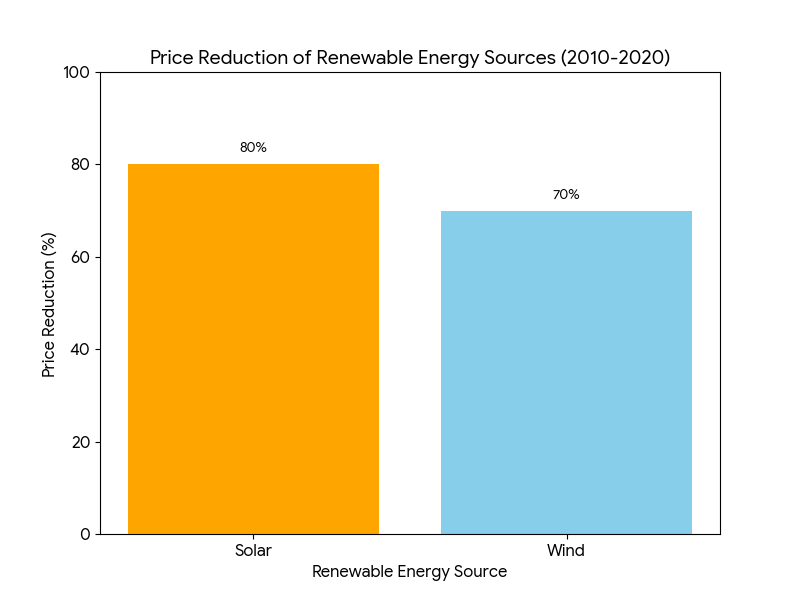Smart business leaders know that sustainable practices aren’t just good for the planet—they’re good for the bottom line. Renewable energy represents one of the most significant opportunities for businesses to reduce costs, enhance their reputation, and future-proof their operations.
The shift toward renewable energy is accelerating across industries. Companies that embrace this transition now will gain competitive advantages that extend far beyond environmental benefits. From cost savings to customer loyalty, renewable energy offers tangible returns that make business sense.
Understanding why renewable energy matters for your business is the first step toward making informed decisions about your energy strategy. Let’s explore the compelling reasons to make this transition and how it can transform your operations.
The Financial Case for Renewable Energy
Long-term Cost Savings
Renewable energy sources have experienced dramatic price reductions over the past decade. Solar and wind power costs have dropped by 80% and 70% respectively since 2010, making them increasingly attractive for business applications.
Traditional energy costs fluctuate with market volatility, commodity prices, and geopolitical events. Renewable energy provides price stability through fixed-rate contracts that can span decades. This predictability allows for better financial planning and budget forecasting.
Many businesses report significant savings within the first few years of transitioning to renewable energy. These savings compound over time, creating substantial cost advantages compared to traditional energy sources.
Government Incentives and Tax Benefits
Federal and state governments offer numerous incentives for businesses adopting renewable energy. These include tax credits, rebates, and accelerated depreciation schedules that can offset initial investment costs.
The federal Investment Tax Credit (ITC) allows businesses to deduct a significant percentage of solar installation costs from their federal taxes. Many states offer additional incentives, creating even more attractive financial packages for renewable energy adoption.
These incentives are designed to encourage business participation in the renewable energy transition. Taking advantage of available programs can dramatically improve the return on investment for renewable energy projects.
Environmental Impact and Corporate Responsibility
Reducing Your Carbon Footprint
Every business has an environmental impact, and energy consumption typically represents a significant portion of that footprint. Switching to renewable energy sources can dramatically reduce greenhouse gas emissions associated with your operations.
This reduction isn’t just about feeling good—it’s about meeting increasing stakeholder expectations for environmental responsibility. Customers, employees, and investors increasingly favor companies that demonstrate genuine commitment to sustainability.
Measuring and communicating your environmental impact improvements can strengthen relationships with environmentally conscious stakeholders. This creates value that extends beyond immediate cost savings.
Meeting Sustainability Goals
Many businesses have established sustainability targets as part of their corporate strategy. Renewable energy adoption is often essential for achieving these goals and demonstrating progress to stakeholders.
Third-party organizations increasingly evaluate businesses based on environmental performance. Strong renewable energy commitments can improve scores with rating agencies and certification programs that influence business relationships.
Setting and achieving renewable energy targets also provides internal motivation for employees who value working for environmentally responsible organizations. This can improve recruitment, retention, and overall workplace satisfaction.
Practical Considerations for Implementation
Energy Needs Assessment
Understanding your current energy consumption patterns is crucial for developing an effective renewable energy strategy. This includes analyzing peak usage times, seasonal variations, and growth projections.
Different renewable energy sources work better for different business types and locations. Solar power might be ideal for businesses with large roof spaces in sunny climates, while wind power could suit operations in windy regions.
Professional energy assessments can identify the most cost-effective renewable energy solutions for your specific situation. These assessments consider factors like local regulations, utility policies, and available incentives.
Choosing the Right Energy Provider
The energy marketplace offers numerous options for businesses interested in renewable energy. Some companies install their own systems, while others purchase renewable energy through their utility providers or third-party suppliers.
Services like Energy Solutions make it easier to compare different providers and find the best renewable energy options for your business. These platforms allow you to evaluate costs, contract terms, and energy sources across multiple providers.
Whether you’re looking at commercial energy solutions or need to compare domestic energy options for smaller operations, having access to comprehensive comparisons helps ensure you get the best deal possible.
Market Positioning and Competitive Advantages
Enhanced Brand Reputation
Consumer preferences increasingly favor businesses that prioritize sustainability. Renewable energy adoption sends a clear message about your company’s values and forward-thinking approach.
This reputation enhancement can translate into increased customer loyalty, positive word-of-mouth marketing, and differentiation from competitors who haven’t made similar commitments.
B2B relationships also benefit from renewable energy commitments. Many large corporations now require suppliers to meet specific sustainability standards, making renewable energy adoption a competitive necessity in some industries.
Future-Proofing Your Business
Energy regulations are becoming more stringent worldwide. Businesses that proactively adopt renewable energy position themselves ahead of regulatory requirements rather than scrambling to comply later.
The transition to renewable energy is inevitable across most industries. Early adopters gain experience, establish supplier relationships, and optimize their systems while competitive pressures are lower.
Technology improvements continue to make renewable energy more efficient and cost-effective. Businesses that begin their transition now can benefit from ongoing innovations and upgrades.
Taking Action on Renewable Energy
The renewable energy transition represents both an opportunity and a necessity for modern businesses. Companies that act now will benefit from cost savings, enhanced reputation, and competitive advantages that compound over time.
Start by assessing your current energy usage and exploring available renewable energy options in your area. Research applicable incentives and compare different providers to find the solution that best fits your business needs and budget.
The renewable energy market continues to evolve rapidly, with new technologies and financing options emerging regularly. Staying informed about these developments will help you make the best decisions for your business’s energy future.
Consider consulting with energy professionals who can provide personalized recommendations based on your specific situation. The investment in professional guidance often pays for itself through optimized system design and maximum incentive utilization.


